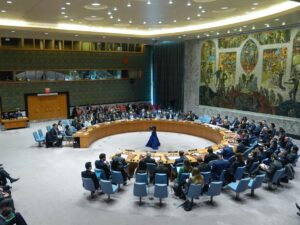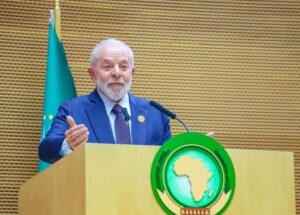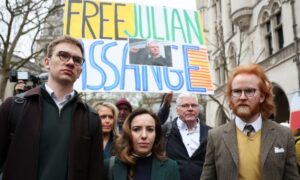
The National Interest Foundation Newsletter
Issue 225, February 23, 2024
Welcome to our NIF Newsletter. This week, we analyze the United States’ vetoing of Algeria’s drafted UN resolution calling for an immediate ceasefire in Gaza and the submitting of their own, examine the circumstances surrounding Brazil’s recall of its ambassador to Israel, and look into how the Julian Assange extradition case raises concern over freedom of speech.
U.S. Vetoes Algeria’s Drafted UN Resolution and Submits Their Own

For months, human rights and peace activists have been emphasizing the importance of an immediate and lasting ceasefire in Gaza. (Photo from AP)
U.S. Vetoes Algeria’s Drafted UN Resolution and Submits Their Own
Earlier this week, the United States decided to strike down an Algerian-drafted UN resolution, which would have demanded an immediate ceasefire in Gaza. The proposed resolution was brought forth to the UN Security Council, but was voted down by the U.S. using its veto power, marking the third time that the United States has vetoed a ceasefire resolution in Gaza. The overall vote in the UN Security Council was 13-1, with the United Kingdom abstaining from it. After voting against the resolution, the U.S. submitted their own which called for a six-week temporary ceasefire. Some analysts were quick to point out that this is the first time that the U.S. has chosen to use the language ceasefire when dealing with the conflict in Gaza – the U.S. had previously avoided the term and vetoed earlier drafts which used it. The vote on the resolution itself demonstrates that Israel’s military offensive has not been well-received in the international community and continues to garner further condemnation, with nations seeking to put an end to the bloodshed.
According to media outlets, many UN members expressed regret that the original ceasefire motion was blocked. Following the veto, Algeria’s UN representative Amar Benjama stated that “unfortunately the Security Council failed once again,” and when referencing U.S. leadership, asked to “examine your conscience and how will history judge you?” Even strong U.S. allies such as France expressed disappointment with the veto. This discontent was similarly reflected back in December, when over three-quarters of the UN General Assembly (193 total members) voted for an immediate humanitarian ceasefire, which shows a symbolic and robust denunciation of Israeli actions in Gaza. Observers have speculated that with the veto and subsequent counter-resolution, the United States is focused on appeasing pro-Israel voices while at the same time attempting to remain a credible actor on the global stage.
The original UN resolution, put forth by Algeria, called for an immediate ceasefire, the release of all hostages, the flow of unhindered humanitarian aid, compliance with international law, and also condemned the forced displacement of Palestinians. The humanitarian provision is critical, as 2 million Palestinian civilians, many of whom are children, face the growing threat of starvation, malnourishment, and disease. The Biden administration claimed that it believed the ceasefire resolution would impede current efforts at achieving a deal between Israel and Hamas. While the resolution prepared by Algeria demanded “an immediate humanitarian ceasefire that must be respected by all parties,” the text spearheaded by the United States only calls for a “temporary ceasefire in Gaza as soon as practicable, based on the formula of all hostages being released.” On top of the provisions for a temporary ceasefire and the release of all hostages, the U.S. alternative resolution called for the lifting of restrictions on humanitarian aid. Within the text, the U.S. additionally warned against an Israeli military offensive in Rafah, where an estimated 1.5 million civilians are currently taking shelter along the Egyptian border, stating that it would have grave consequences for regional security. It is justifiably feared that an Israeli offensive in Rafah would result in the killing of more innocent Palestinian civilians, as Israel has already indiscriminately killed tens of thousands in Gaza since early October. Others who survived could likely be forced to flee Rafah into neighboring Egypt. Ultimately, an Israeli military offensive in Rafah would be catastrophic, and would exacerbate the already-dire humanitarian crisis in Gaza.
The United States’ desire to allow negotiations to play out and not rush a vote on the matter comes at a time when Palestinians in Gaza are in desperate need of aid and humanitarian relief. Without initiating an immediate ceasefire, the humanitarian crisis will become progressively more desperate and regrettably, more lives will be lost. Over 29,000 have been killed in the past four months, and an Israeli military offensive in Rafah would worsen this. Israeli war cabinet member Benny Gantz and others have warned that there could be a massive offensive on Rafah, underscoring the importance of an immediate and lasting ceasefire. Had the original Algerian-drafted resolution gone through, Israel would have been legally obligated to abide by it and commit to a ceasefire in Gaza – and would have otherwise faced consequences for failing to do so. Given that both the lives of innocent civilians and regional stability are on the line, there is a need to continue pushing for a ceasefire that upholds human rights and prevents potential harmful escalations.
Brazil’s Recall of Its Ambassador to Israel

Brazilian President Lula’s remarks at this past weekend’s 37th African Union Summit add to the growing condemnation towards Israel’s destructive actions in Gaza. (Photo from AFP)
Brazil’s Recall of Its Ambassador to Israel
At the African Union Summit last Sunday, Brazilian President Luiz Inácio Lula da Silva strongly criticized Israel’s military offensive in the Gaza Strip, drawing parallels between it and Nazi actions during the Holocaust. A diplomatic rift has since emerged, with Brazil recalling its ambassador to Israel while the latter declared Brazil’s president as “persona non grata.” The comments by Lula are some of the latest in increasing denunciation regarding Israel’s human rights violations in Gaza, which have killed more than 29,000 Palestinians – two-thirds of whom have been women and children, devastated the enclave, and forcibly displaced millions from their homes. In fact, leaders at the summit where Brazilian President Lula spoke also condemned Israel’s offensive in Gaza and called for its immediate end. Moussa Faki, the chair of the African Union Commission, stated that it was the most flagrant violation of international humanitarian law, and others praised the case brought by South Africa against Israel at the International Court of Justice.
Additionally, both Colombia and Bolivia have backed Brazil’s President Lula in the ongoing diplomatic row with Israel. Gustavo Petro and Luis Arce, the presidents of Colombia and Bolivia respectively, expressed solidarity with Lula. Petro stated that “In Gaza there is a genocide and thousands of children, women, and elderly civilians are cowardly murdered…Lula has only spoken the truth…the entire region must unite to immediately end the violence in Palestine.” He also added that the decision of the International Court of Justice in the case brought by South Africa against Israel should bear actionable consequences on the diplomatic relations of countries around the world. Meanwhile, Arce remarked that “History will not forgive those who are indifferent to this barbarity…the Brazilian president told the truth about the genocide being committed against the brave Palestinian people.” It was rightly pointed out by others that justifiable criticism of the Israeli government’s abusive actions is not anti-Semitic, contrary to what biased defenders of Israel often like to try and claim. Lula’s wife, the First Lady of Brazil Rosângela Lula da Silva, stated that the Brazilian president’s speech referred to the Israeli government and not to the Jewish people, highlighting that had Lula been alive during World War II, he would have spoken up for persecuted Jews in the same manner. Labeling legitimate criticism of Israel’s actions as anti-Semitic is inaccurate and dangerous, because it is used as a political tool aimed at shielding Israel from fair rebuke.
Even prior to Lula’s remarks this past Sunday, Brazil had been vocal in recent months about the War on Gaza, condemning Israel for its indiscriminate attacks against Palestinian civilians and crucial infrastructure in the besieged enclave. Lula himself said in late 2023 that the killing of thousands of children is particularly shocking and concerning. Furthermore, at the United Nations Security Council, Brazil has supported every single resolution calling for a ceasefire in Gaza. Lula was also at the airport tarmac in Brasilia to welcome back Palestinian-Brazilians as they returned on repatriation flights in the preceding months. Brazil is far from the first and only country to see a souring of diplomatic relations with Israel in the aftermath of the War on Gaza. Dozens of countries have called out Israel for its abusive actions, and others have severed relations or made official diplomatic protests. This includes Belize, Chile, Colombia, Bolivia, Honduras, Turkey, and South Africa – to name some. Back in November, South African lawmakers voted in favor of a motion calling for the closure of the Israeli embassy and the cutting of diplomatic ties until Israel agrees to a ceasefire in Gaza. They also recalled their ambassador to Israel and withdrew all diplomatic staff. Notably, on the global stage, South Africa has put forth a landmark case against Israel at the International Court of Justice which has so far prompted the judicial body to issue a preliminary ruling stating that Israel must take several concrete measures to prevent acts of genocide against Palestinians. There is also an ongoing separate case at the International Court of Justice whereby at least 52 countries will present arguments related to controversial Israeli policies in the illegally-occupied West Bank and Gaza Strip.
In recent days, Brazilian Foreign Minister Mauro Vieira relayed displeasure with Israel’s reaction to Lula’s remarks, accusing Israel of trying to create a smokescreen to cover up and divert attention away from what is taking place in Gaza. Vieira expressed that “The words from Netanyahu’s government are deceiving in their content…they’re putting up a smokescreen to hide the real problem which is the ongoing massacre in Gaza.” He also added that it would be unacceptable for Lula to retract or deny the Israeli war crimes and human rights violations that are being perpetrated there.
Julian Assange Extradition Case Raises Concern Over Freedom of Speech

Demonstrations in support of Assange have been taking place in London. (Photo from Reuters)
Julian Assange Extradition Case Raises Concern Over Freedom of Speech
Few individual rights have been safeguarded as closely as the freedoms of speech, press, and expression, all of which are enshrined under the First Amendment of the U.S. Constitution, the Universal Declaration of Human Rights (UDHR), and exist in 165 counties worldwide according to the World Population Review. Universally, these freedoms are an important part of maintaining a healthy and lively democracy in which ideas and information can be shared. However, WikiLeaks founder Julian Assange’s long-fought extradition case has raised concerns over speech and press freedoms. Recently, London’s High Court held two days of hearings, which will decide whether Assange can appeal the U.S. request for extradition to stand on trial for 17 counts of espionage charges. These were levied against Assange for his alleged role in encouraging and aiding U.S. Army intelligence analyst Chelsea Manning, who seized hundreds of thousands of diplomatic cables and military files that were subsequently published on WikiLeaks. Assange’s wife, Stella Assange, noted that such an extradition would be a death sentence, due to the 52-year-old’s deteriorating physical and mental health. These health concerns, it is feared, could get worse upon arrival in the notoriously harsher U.S. prison system. The court’s decision is not expected to arrive for at least another month, but if the decision is to extradite Assange, then his council plans to appeal to the European Court of Human Rights in an attempt to halt the process.
One of the reasons that Assange’s extradition case has been highly controversial is because it is unclear whether he had played a direct role in obtaining the documents and whether the publication of the documents was harmful. U.S. lawyers attempting to extradite Assange claim that he had put lives at risk by publishing unredacted documents. However, there is substantial evidence that suggests that he was not the one who redacted the documents. Independent journalist, Chris Hedges, revealed that Assange had initially redacted the files, but the unredacted versions were first published by the website Cryptome. Furthermore, there is no evidence that anyone named in the documents has come to harm and other allegations have been debunked as well. If this is the case, then what Julian Assange is being charged with is being a journalist and not a conspirator.
If Assange is prosecuted by the U.S., he will surely face prison time and his case will set a dangerous precedent for investigative journalists worldwide. He would be charged under the 1917 Espionage Act, which was never intended to target publishers and journalists. The secrecy-busting journalism that Assange provided through the WikiLeaks publications exposed U.S. war crimes and abuses in both Iraq and Afghanistan. According to Amnesty International, “News and publishing outlets often and rightfully publish classified information to inform on matters of utmost public importance. Publishing information that is in the public interest is a cornerstone of media freedom. It’s also protected under international human rights law and should not be criminalized.” The worry is that the potential precedent set by this case could be used as justification for other countries to silence opposition voices and conceal important information. Historically, certain U.S. actions have backfired as they have been used by repressive regimes to justify their own actions. Julia Hall, an Amnesty International expert on counterterrorism and criminal justice in Europe, contends that “the risk to publishers and investigative journalists around the world hangs in the balance. Should Julian Assange be sent to the United States and prosecuted there, global media freedoms will be on trial, too.”
The fundamental problem with the extradition case is that it prioritizes security over freedom; however, given that there is no evidence that Assange was directly involved in the breach, the case has very little to do with security and everything to do with political motivations. To some analysts, the U.S. is seeking political retribution by jailing the man deemed responsible for bringing violations to light. It is in the United States’ best interest to maintain fair and democratic practices so as not to appear hypocritical when condemning oppressive entities. At a time when global events and crises necessitate fair and independent journalism, this case has become all the more important.
